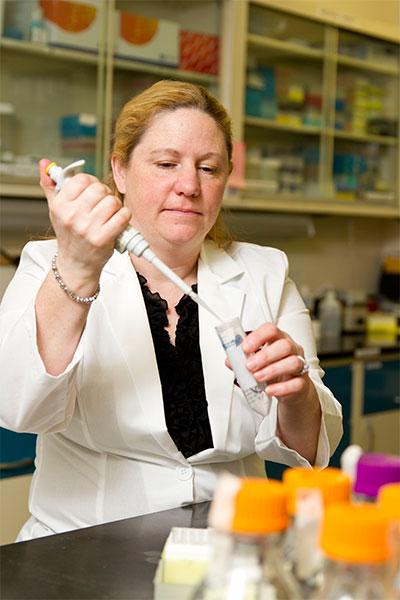Surviving Cells
Ted Nash Long Life Foundation Grant Funds TTUHSC Researcher

The American Heart Association considers diabetes to be one of the seven major controllable risk factors for cardiovascular disease. They state there is a strong correlation between cardiovascular disease and diabetes.
• At least 68 percent of people age 65 or older with diabetes die from some form of heart disease; and 16 percent die of stroke.
• Adults with diabetes are two to four times more likely to die from heart disease than adults without diabetes.
Jannette Dufour, Ph.D., associate dean for Research and associate professor in the Department of Cell Biology and Biochemistry, has researched diabetes. Now, through a Tedd Nash Long Life Foundation two-year grant, “Reducing Cardiovascular Risks Using Sertoli Cell-Based Gene Therapy,” her research investigates how to treat cardiovascular risks from diabetes.
“Rather than using insulin to treat blood glucose and diabetes, we are using a different
molecule to treat cardiovascular disease,” Dufour said.
Dufour’s lab previously researched Sertoli cells. Sertoli cells are found in the testes
and protect the germ cells from an immune response. Sperm cells are not present at
birth. When the immune system is developing they are not there. They later appear
at puberty.
“With these new cells, the immune system doesn’t know what they are,” Dufour said. “Sertoli cells, besides providing appropriate things for nurturing and development of germ cells, they modify the immune response and protect them. We have been taking advantage of that in cell transplantation.”
Dufour’s lab has been co-transplanting Sertoli cells with pancreatic islets to treat diabetes.
“Our lab’s goal is understanding how Sertoli cells are modifying the immune response to protect those islet cells,” Dufour said. “They modify the immune response to allow protection of other cells like the pancreatic islets.”
Now with the Nash grant, the other area of focus is engineering Sertoli cells to make therapeutic proteins.
“The idea is since they can protect islets and germ cells, and they survive, rather then try to protect another cell, why not get the sertoli cell to make what you want and then use it to deliver it,” Dufour said. “The advantage is when the islets are not protected, the Sertoli cells will survive without the use of continuous immune suppressive drugs. If the Sertoli cells are surviving, why not just use them.”
Dufour’s delivering insulin research, “Genetically Engineered Sertoli Cells as a Vehicle for Cell-Based Gene Therapy,” was funded through the Wilson Foundation. Now the lab uses Sertoli cells that are making insulin and using diabetes models to treat diabetes. She also is funded by the National Institutes of Health on the immune part of regulatory T-cells, “Regulatory T-Cells to Improve Sertoli Cell Protection of Transplantation of Islets.”
The next step through the Nash grant relates to treating diabetes complications.
Dufour said receiving the grant was exciting since the foundation had not funded TTUHSC
in 10 years and is highly competitive.
“This is an exciting phase of our research,” Dufour said. “Hopefully it will keep our door open for the foundation to fund our institution. With heart disease you have a two-to four-fold increase for cardiovascular disease. It would be ideal to treat both things, diabetes and cardiovascular disease.”
Related Stories
Celebrating Veterans: TTUHSC’s General Martin Clay’s Legacy of Service and Leadership
From his initial enlistment in the Army National Guard 36 years ago to his leadership in military and civilian health care management roles, Major General Martin Clay’s career has been shaped by adaptability, mission focus and service to others.
Texas Tech University Health Sciences Center School of Nursing Named Best Accelerated Bachelor of Science in Nursing Program in Texas
The TTUHSC School of Nursing Accelerated Bachelor of Science in Nursing (BSN) program has been ranked the No. 1 accelerated nursing program in Texas by RegisteredNursing.org.
TTUHSC Names New Regional Dean for the School of Nursing
Louise Rice, DNP, RN, has been named regional dean of the TTUHSC School of Nursing on the Amarillo campus.
Recent Stories
The John Wayne Cancer Foundation Surgical Oncology Fellowship Program at Texas Tech University Health Sciences Center Announced
TTUHSC is collaborating with the John Wayne Cancer Foundation and has established the Big Cure Endowment, which supports the university’s efforts to reduce cancer incidence and increase survivability of people in rural and underserved areas.
TTUHSC Receives $1 Million Gift from Amarillo National Bank to Expand and Enhance Pediatric Care in the Panhandle
TTUHSC School of Medicine leaders accepted a $1 million philanthropic gift from Amarillo National Bank on Tuesday (Feb. 10), marking a transformational investment in pediatric care for the Texas Panhandle.
Texas Tech University Health Sciences Center Permian Basin Announces Pediatric Residency Program Gift
TTUHSC Permian Basin, along with the Permian Strategic Partnership and the Scharbauer Foundation, Feb. 5 announced a gift that will fund a new pediatric residency.
